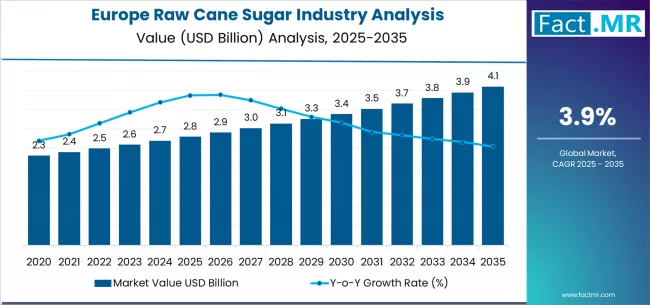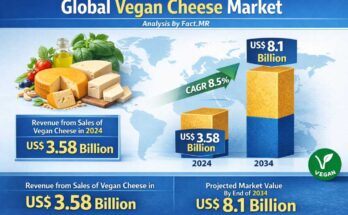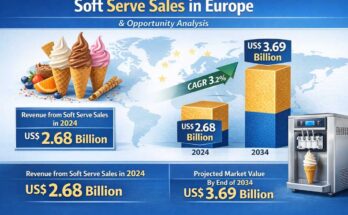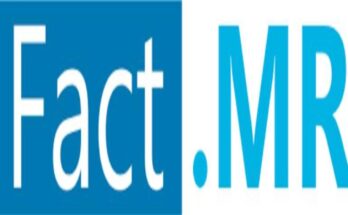The Europe raw cane sugar market is poised for steady expansion as sustainability commitments, evolving trade dynamics, and consumer demand for natural sweeteners redefine the regional sugar industry. According to a recent report by Fact.MR, the market is projected to increase from USD 2.8 billion in 2025 to approximately USD 4.1 billion by 2035, marking an absolute increase of USD 1.3 billion. This reflects a total growth of 46.4%, translating into a CAGR of 3.9% during the forecast period.
As Europe balances domestic production with sustainable imports, raw cane sugar continues to play a vital role in food processing, beverage manufacturing, and specialty ingredient applications.
Strategic Market Drivers
- Rising Demand for Natural and Unrefined Sweeteners
European consumers are increasingly shifting toward natural, less processed alternatives to refined sugar. The growing popularity of “clean label” and organic food products has boosted demand for raw cane sugar, particularly in bakery, confectionery, and beverage applications. This trend aligns with the broader health and wellness movement emphasizing natural ingredients and traceable sourcing. - Sustainable Sourcing and Trade Policies
European trade policies, particularly those concerning imports from the ACP (African, Caribbean, and Pacific) and LDC (Least Developed Countries) regions, have fostered long-term partnerships in sustainable sugar sourcing. With the EU’s emphasis on ethical supply chains and environmental compliance, sugar producers are adopting fair-trade certifications and eco-friendly production practices to maintain competitiveness. - Growth in Food and Beverage Manufacturing
The expansion of the European food and beverage industry continues to drive raw cane sugar demand. Its application in specialty foods, artisanal products, and premium beverages is increasing as manufacturers target niche markets with authentic flavor and color profiles. Furthermore, ongoing product innovations in energy drinks, dairy-based desserts, and flavored syrups are supporting market growth. - Technological Advancements in Processing
Innovation in sugar refining and processing is helping reduce environmental impact and enhance product quality. Modern milling technologies and energy-efficient processing facilities in Europe are enabling producers to deliver high-quality, eco-conscious sugar products while maintaining cost-effectiveness and regulatory compliance.
Browse Full Report: https://www.factmr.com/report/europe-raw-cane-sugar-industry-analysis
Regional Growth Highlights
Western Europe: Market Leadership Through Sustainable Innovation
Countries such as France, Germany, and the United Kingdom lead in both consumption and innovation. These regions are focusing on carbon-neutral production, renewable energy usage in sugar mills, and traceable supply chains.
Eastern and Southern Europe: Rising Consumption and Domestic Production
Growing urbanization and food manufacturing activity in Poland, Italy, and Spain are creating new demand opportunities. Government support for local sugar production and diversification from beet sugar to cane-based alternatives are reshaping market dynamics.
Import-Driven Growth Across Key Hubs
Despite limited domestic cane cultivation, European refineries and importers play a significant role in global sugar trade, sourcing from regions such as Brazil, Mauritius, and Thailand. Investments in advanced refining infrastructure are helping balance quality, sustainability, and cost efficiency.
Market Segmentation Insights
By Type:
- Conventional Raw Cane Sugar: Dominates the market due to widespread use in food processing and industrial applications.
- Organic Raw Cane Sugar: Witnessing faster growth as consumer preferences lean toward certified organic and ethically sourced ingredients.
By End Use:
- Food & Beverage: Accounts for the majority of demand, driven by bakery, confectionery, and beverage manufacturers.
- Retail & Household: Steady growth supported by the popularity of natural sweeteners for home consumption.
- Industrial Applications: Expanding use in bioethanol and fermentation industries adds to market resilience.
Challenges and Market Considerations
Despite strong growth prospects, several factors could shape market performance:
- Price Volatility: Global sugar price fluctuations and trade policy changes can impact profitability.
- Environmental and Social Compliance: Tightening EU regulations on sustainability, fair labor, and deforestation-free sourcing are reshaping production strategies.
- Competition from Beet Sugar and Sweetener Substitutes: Domestic beet sugar production and artificial sweeteners continue to influence market share dynamics.
Key Players in the European Raw Cane Sugar Market
Leading industry participants are focusing on vertical integration, sustainable sourcing partnerships, and digital supply chain management to strengthen their market positions.
Major Companies Include:
- Louis Dreyfus Company B.V.
- Cargill, Incorporated
- Archer Daniels Midland Company (ADM)
- Tate & Lyle PLC
- Associated British Foods plc
- Mitr Phol Sugar Corporation Limited
- Tereos Group
- Wilmar International Limited
- Südzucker AG
- Nordzucker AG
These players are investing in low-carbon refining, traceability technologies, and strategic imports to meet Europe’s growing demand for sustainable sugar.
Future Outlook: Toward a Sustainable Sweetener Economy
The next decade will see Europe’s raw cane sugar market transitioning toward sustainability, transparency, and innovation. Producers and importers are expected to prioritize eco-certified sourcing, carbon footprint reduction, and bio-based byproduct utilization.
With robust consumer demand, evolving trade partnerships, and sustainability-led innovation, the Europe raw cane sugar market is positioned for healthy and enduring growth through 2035. Companies that embrace ethical sourcing and technological modernization will define the future of Europe’s sweetener industry—one that is both economically viable and environmentally responsible.



